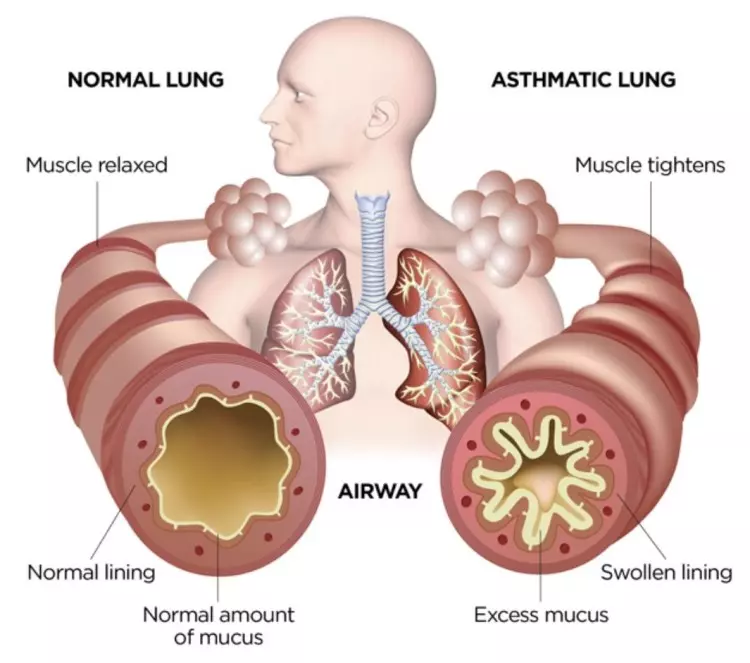It is estimated that approximately 10% of the world’s population have asthma.
Asthma is a condition that affects the passages of the lungs–specifically the bronchioles. During an asthma attack, the wall of the bronchiole contracts, narrowing the airway. The narrowing further aggravates the airway leading to inflammation and increase in secretions in the mucus membranes, which can lead to blockage of the airway.
Some Interesting Facts about Asthma
● Asthma has a strong genetic link. Children who develop asthma are three to six times more likely to have a parent with asthma.
● Asthmatics are also more likely to have a coexisting allergic condition such as eczema or allergic rhinitis. Environmental exposures such as air pollution, industrial dust, chemical fumes and mold exposure are believed to play a role in development.
● Exposure to cigarette smoke can irritate the airways. Mothers who smoked during pregnancy or were exposed to secondhand smoke are more likely to have children with asthma.
● Childhood obesity also increases the risk of asthma. This is likely related to low grade levels of inflammation already present in the body.
● Gut health has also been linked to asthma. Within the gut, an imbalance of gut bacteria and fungi has been linked to an increased risk of asthma directly through the gut-lung axis.
Treatment for asthma includes inhalers that either dilate the airways which can be used acutely, or steroid inhalers that work by reducing the inflammation in the bronchioles.
Asthma Can also Affect Your Oral Health
People with asthma are more likely to be mouth breathers which can lead to dry mouth. Dry mouth can lead to issues with gum disease and tooth decay.
Individuals with asthma are also 75% more likely to develop acid reflux than those without asthma. Acid reflux can further cause damage to the tooth enamel and increase susceptibility to development of cavities. Good salivary flow is essential to maintaining a healthy enamel, but dry mouth and acid reflux can affect the PH of the saliva.
Asthma medications that use corticosteroids can further increase risk of poor oral health. Chronic use of steroid inhalers can increase risk of candida infections such as oral thrush. Some research also shows that children with asthma can have elevated calcium in the saliva leading to calcified plaque on teeth. Even inhalers that are not corticosteroids can cause a change in the PH of saliva, therefore it’s important to take some precautions to minimize this risk.
1. After using an inhaler, rinse out your mouth with water to prevent a change in PH, but also to avoid having any residuals of the medicine linger in the mouth.
2. Sugar free chewing gum after using an inhaler has also been shown to help.
3. Use of a mouth spacer that attaches to an inhaler has also shown to help minimize oral adverse effects since this helps to more directly transport the medicine in the inhaler to the lungs, instead of the mouth or stomach.
Additionally, you can lower your risk of developing asthma and minimize symptoms with certain foods that can support your microbiome and strengthen your gut-lung axis. Foods that have been shown to help relieve asthma symptoms are ones rich in inflammatory fighting antioxidants such as oranges, spinach and pomegranates. High fiber foods such as beans and root vegetables have also been shown to decrease asthma incidence since they promote a healthier microbiome.
If you think you have asthma symptoms, speak to your doctor to discuss treatment options.
The two most common types of inhalers are Albuterol and Flovent:
Buy Albuterol Online – Salbutamol Canada
Buy Flovent Online – Fluticasone Canada

Photo Credit: by Courtesy of the Asthma and Allergy Foundation of America
Reference articles:
8 Foods That May Help Relieve Asthma Symptoms
What Causes Asthma? | American Lung Association
Can Asthma Inhalers Cause Cavities? | Smile Generation
Why Do I Need to Rinse My Mouth After Using an Inhaler? | Asthma and Allergy Foundation of America
Asthma & Oral Health: What You Need to Know | Smile Michigan
Asthma’s Effects on Oral Health - Decisions in Dentistry
###
Your email address will not be published. Required fields are marked with *.